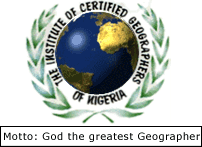|
COMMUNIQUE OF THE INAUGURAL SEMINAR OF THE INSTITUTE OF CERTIFIED GEOGRAPHERS OF NIGERIA ORGANISED TO MARK THE INDUCTION OF THE NEWLY REGISTERED MEMBERS OF THE INSTITUTE HELD AT THE NATIONAL LIBRARY, BIDA ROAD, KADUNA, FROM 7TH AND 8TH, NOVEMBER, 2008.
PREAMBLE
The Institute of Certified Geographers of Nigeria was established to champion the cause of Geography Professions i.e. all disciplines concerned with the Earth as the Home of Man. This Year 2008, the institute marked its first inaugural seminar and induction of the newly registered members held at the main Auditorium of the National Library, Bida Road, Kaduna, from 7 th and 8 th November,2008.The Central theme of the Seminar was Attaining a Sustainable Environment in Nigeria: the Place of Interdisciplinary Inquiry. The seminar had the followings as its sub-themes:
…
The above themes were carefully chosen following their relevance in achieving vision 2020 and Sustainable development in Nigeria
PARTICIPATION
The seminar, being the first of its kind organised by the institute, brought together practitioners and academicians in the environmental arena discussing as one family thus eliminating the professional and disciplinary biases that exist among them. With this, the aim of the Programme which was to advocate interdisciplinary inquiry in environmental management is said to be fully achieved. Also participants were drawn from both the Federal and State Ministries, Agencies and the private sectors of the economy.
BRAINSTORMING AND DELIBERATION SESSION
Several brainstorming and deliberation sessions lasting a number of hours were held during the two days. The central theme discussed was Attaining a Sustainable Environment in Nigeria: the Place of Interdisciplinary Inquiry. During these sessions, participants discussed freely from their wealth of experiences what we need to do as a country to achieve sustainable environment.
RECOMMENDATIONS
At the end of a thorough and comprehensive discussions, participants arrived at the following far-reaching recommendations:
1. should top the agenda of the government.
2. In view of the above, an enquiry into Nigerian environment should involve interdisciplinary research integrating natural Sciences, social sciences and the humanities in a broad holistic study.
3. Government should not pay lip service to the issue of climate change since its consequences are devastating. To curb the situation, government should make sure that the number of people depending directly on the natural environment is reduced through implementation of a comprehensive poverty eradication programme particularly in the 19 Northern States where poverty is greatly experienced.
4. That the government, NGOs, CBOs concern with the environment should ensure that every research to address environmental problems or any project to address same follows bottom-top approach rather than the top-bottom already practised by government and other organisations. If this is adopted it will ensure participation from the grass roots and subsequently sustainability of environmental projects.
5. The need for “attitudinal change” by Nigerians towards being more friendly to the environment through, good waste disposal mechanisms, general environmental cleanliness and sanitation; as well as greening their surroundings should be preached by all.
6. Government at all levels should adopt the waste-to-wealth principles generally called recycling. This will greatly solve the problem of waste management in the country.
7. Government should revisit and strengthened the existing technological strategies on environmental governance and ensure that they are strictly adhered to particularly those that relate to the built up environment.
8. Government should make sure that Ecological Report from qualified hands is produced and be made public before the commencement of any environmental project in the country and a review and monitoring committee be set by either the Federal or State environmental ministry or agency responsible for environmental management in that locality to ensure that recommendations from the report are followed judiciously.
9. Government, NGOs, CBOs and Concerned Individuals should see to it that it is our collective responsibility to provide accurate information on the state of the environment in our locality. This will go a long way to assist government and concerned organisations particularly at the time disaster strikes.
10. To proper facilitate the provision of accurate information on the state of environment, the government should ensure that environmental data collection centres are opened in all the local governments of the 36 States. This will provide valuable information that will aid disaster forecasters, researchers and investors particularly in the tourist industry.
11. Government should ensure that environmental laws are strengthened to fight environmental ills at all levels.
12. Government should ensure that all impediments to environmental governance such as fraud, politics, religion and culture, etc. be removed
13. Finally, government should ensure that the will to implement both the international and national agreements on environmental sustainability is not jeopardised.
|
ALH. ADAMU DABO SAMBO, FCG
|
TERDOO FANEN,ACG
|
|

